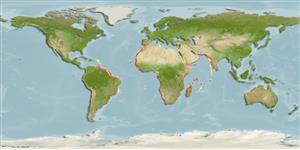Common names from other countries
Environment: milieu / climate zone / depth range / distribution range
Ecologie
; diepteverspreiding 0 - 50 m (Ref. 101292). Tropical; 10°C - 30°C (Ref. 113750), preferred 26°C (Ref. 107945); 37°N - 35°S, 64°W - 82°E
Western Indian Ocean, Atlantic Ocean and the Mediterranean Sea: from the southern Caribbean to Uruguay, eastern Atlantic from Portugal to Senegal, and Congo to South Africa, and in the western Indian Ocean from South Africa to Sri Lanka. Introduced in the Gulf of Mexico. Tropical and subtropical.
Length at first maturity / Size / Gewicht / Leeftijd
Maturity: Lm ? range ? - ? cm Max length : 17.0 cm SHL mannelijk/geslacht niet bekend; (Ref. 271)
Shell mussel-shaped, ventral margin straight, posterior end rounded. Shell surface smooth except for fine growth lines. Hinge 1 or 2 teeth. Periostracum flaky. Colour: externally brown or light brown with concentric yellow bands near ventral margin, internally purple, nacreous.
It is heavily exploited commercially, stocks are dwindling in southernmost part or range. Consumed boiled in juices, marinated, grilled with rice, or in a number of different local dishes. Canned industrially (Ref. 271). Minimum depth from Ref. 104365.
Life cycle and mating behavior
Geslachtsrijpheid | Voortplanting | Kuitschieten | Eieren | Fecundity | Larven
Members of the class Bivalvia are mostly gonochoric, some are protandric hermaphrodites. Life cycle: Embryos develop into free-swimming trocophore larvae, succeeded by the bivalve veliger, resembling a miniature clam.
Carpenter, K.E. (ed.). 2002. (Ref. 271)
Status op de Rode Lijst van het IUCN (Ref. 130435: Version 2024-1)
Status bij CITES (Ref. 108899)
Not Evaluated
Not Evaluated
Gebruik door de mens
Visserij: van groot commercieel belang
FAO - Aquacultuur: production; Visserij: landings | FishSource | Sea Around Us
Tools
Internet-bronnen
Estimates based on models
Preferred temperature
(Ref.
115969): 14.8 - 27.8, mean 24.9 (based on 654 cells).
Weerstandsvermogen
Hoog, minimale populatieverdubbelingstijd minder dan 15 maanden (K=0.06-1.5).
Kwetsbaarheid
Low to moderate vulnerability (29 of 100).
